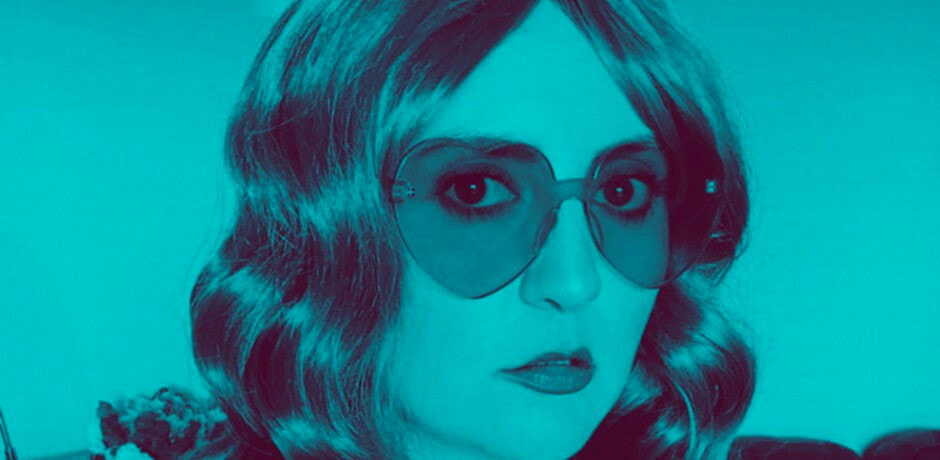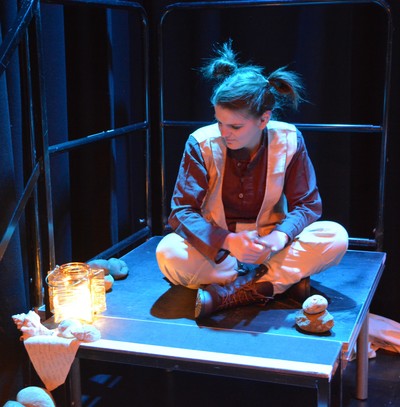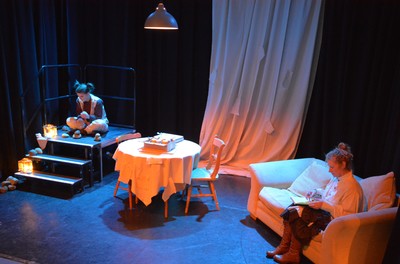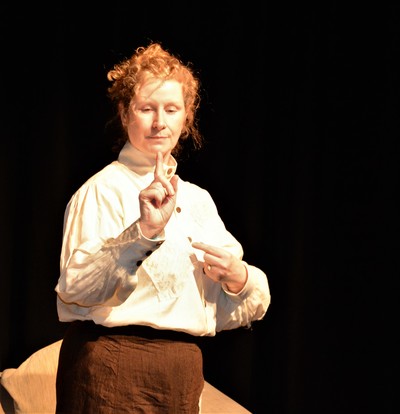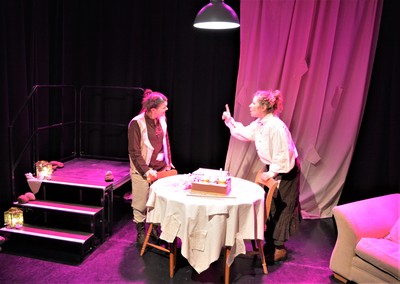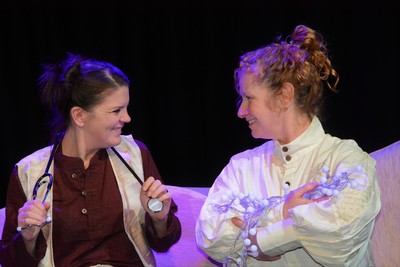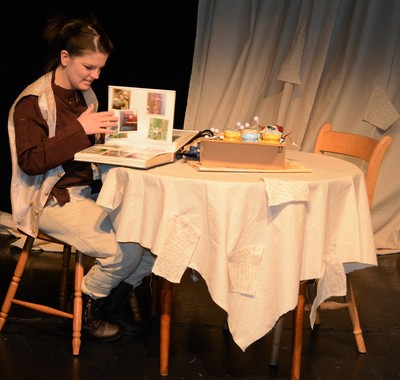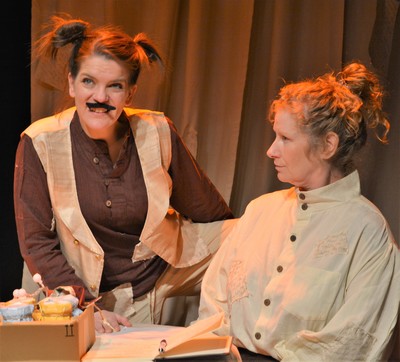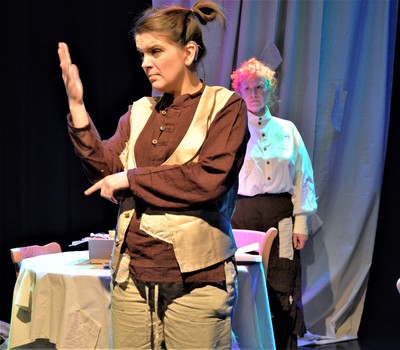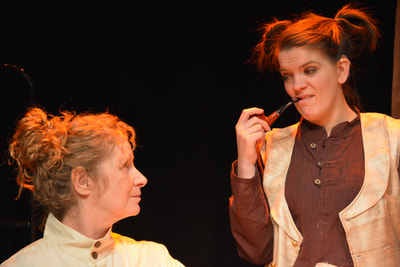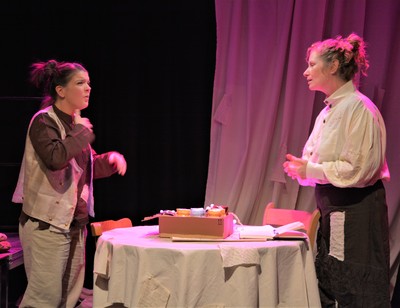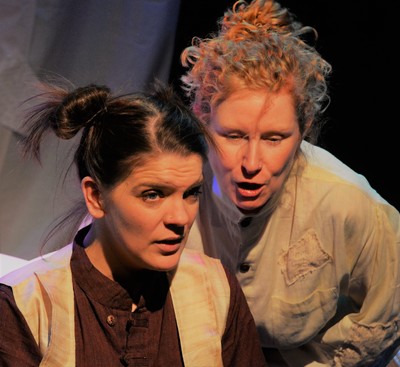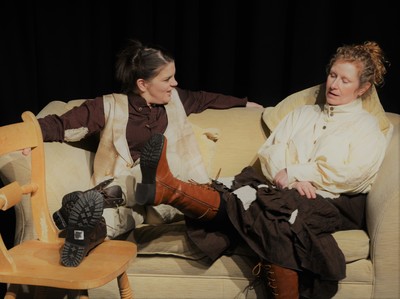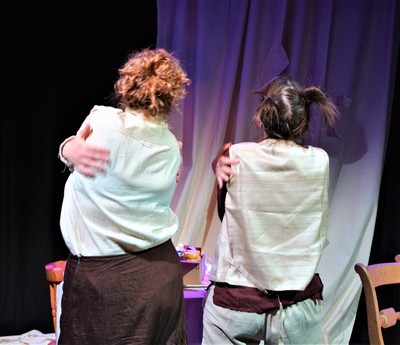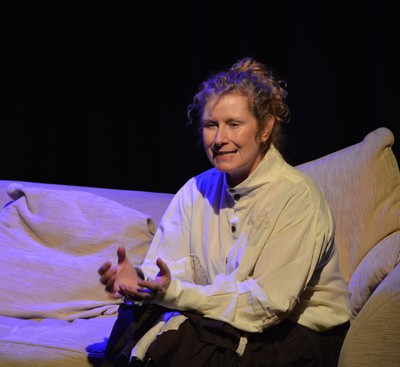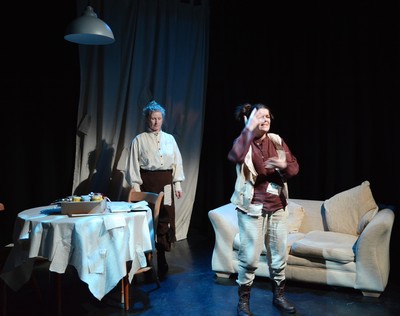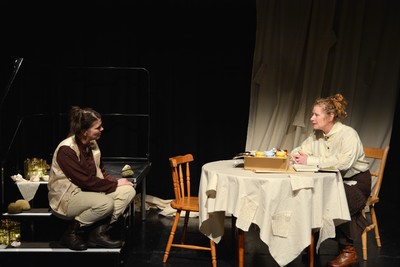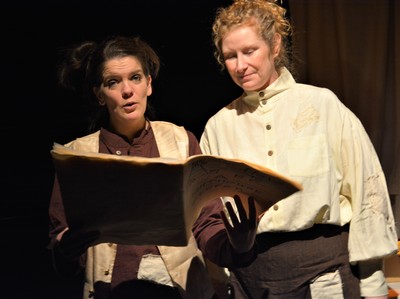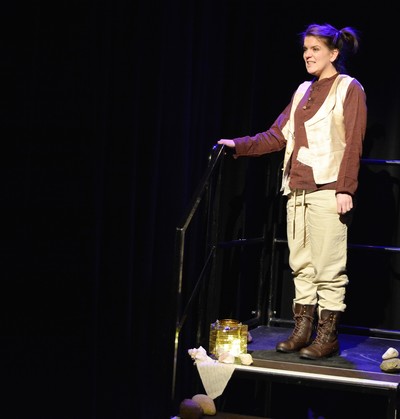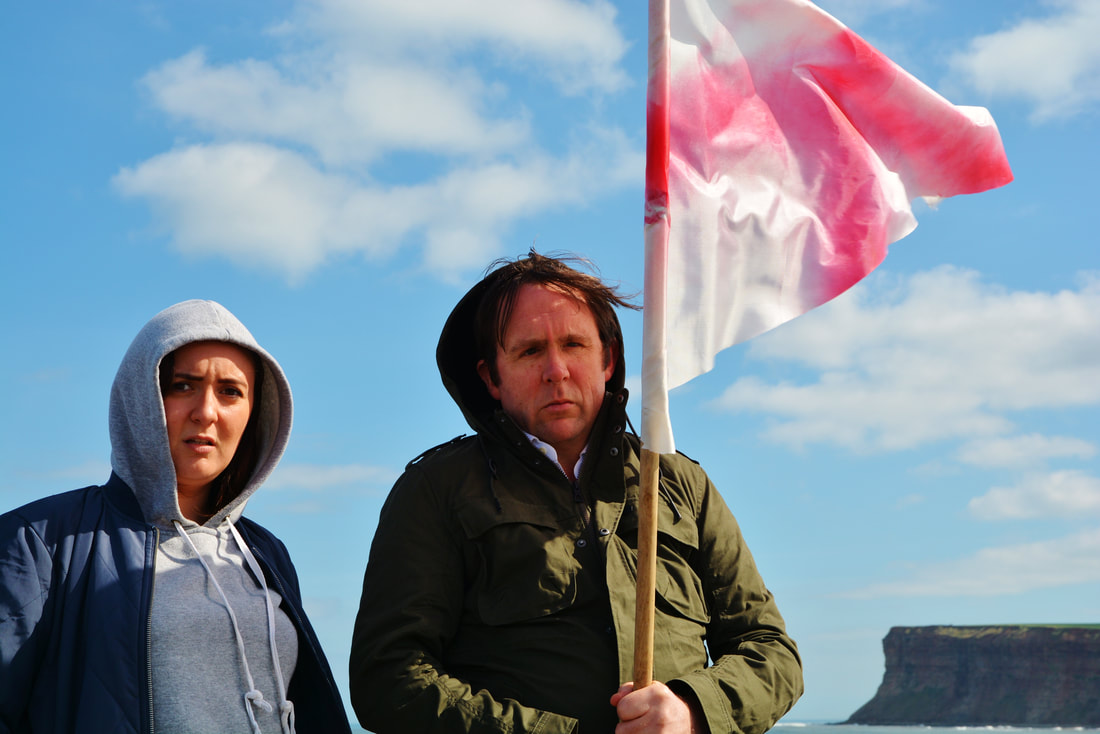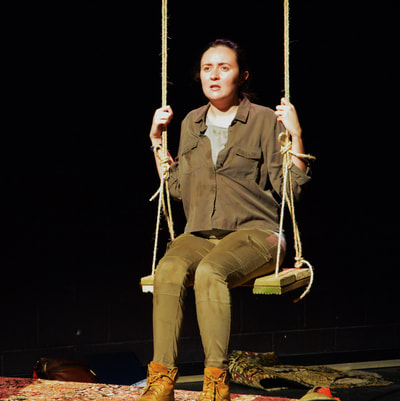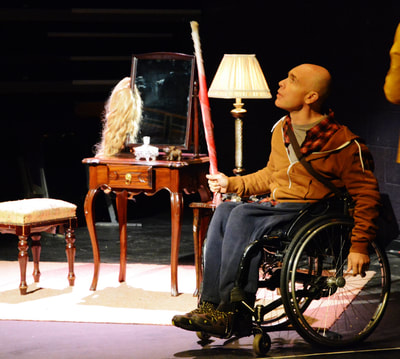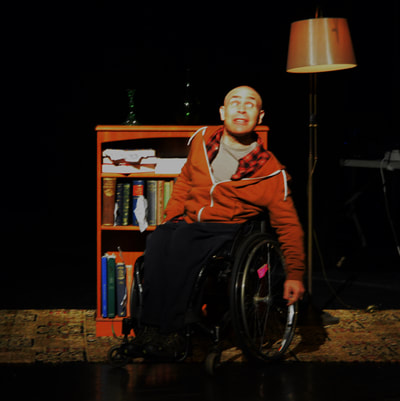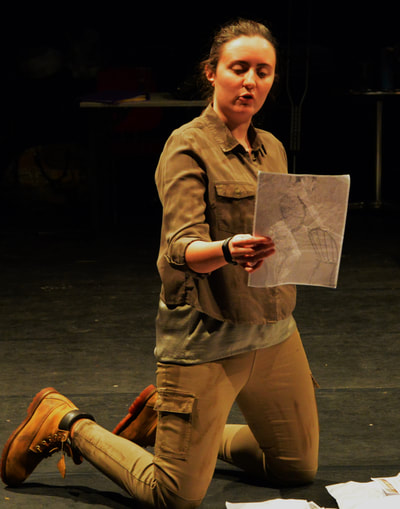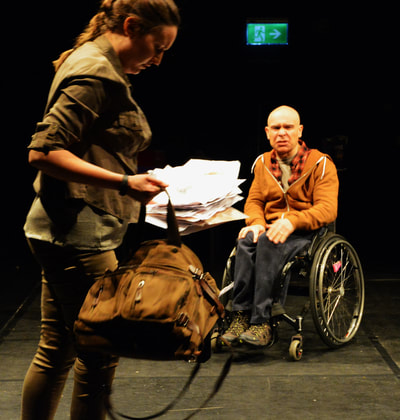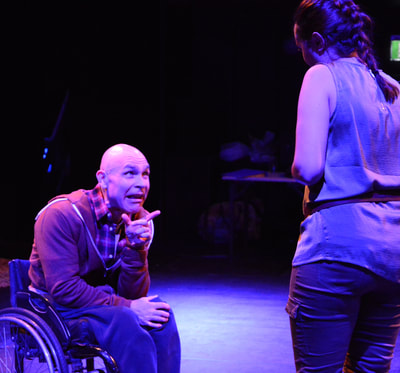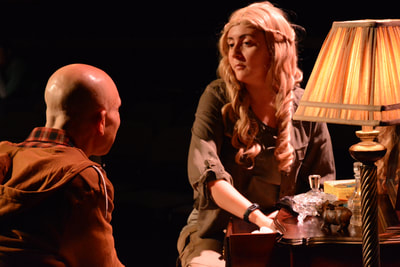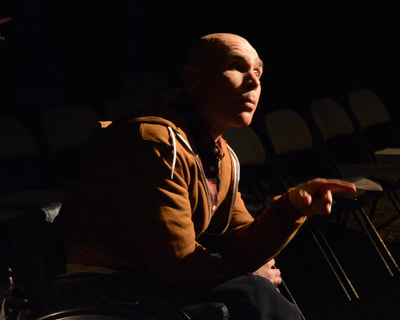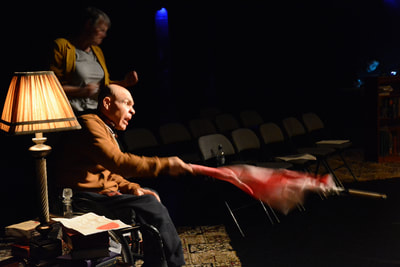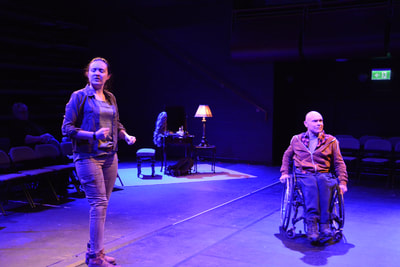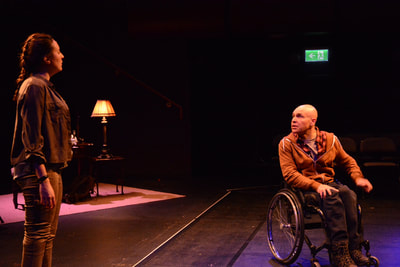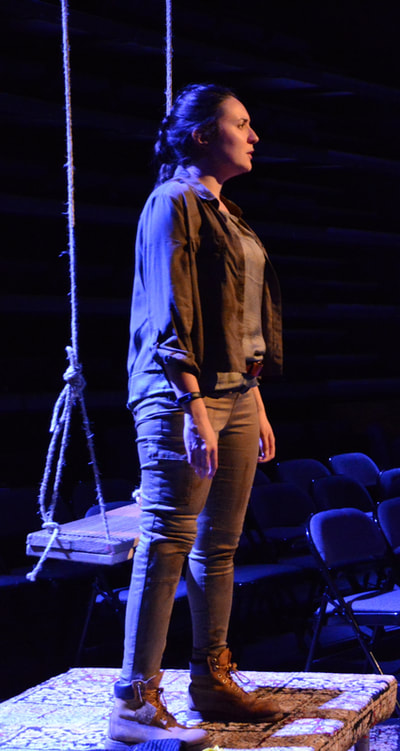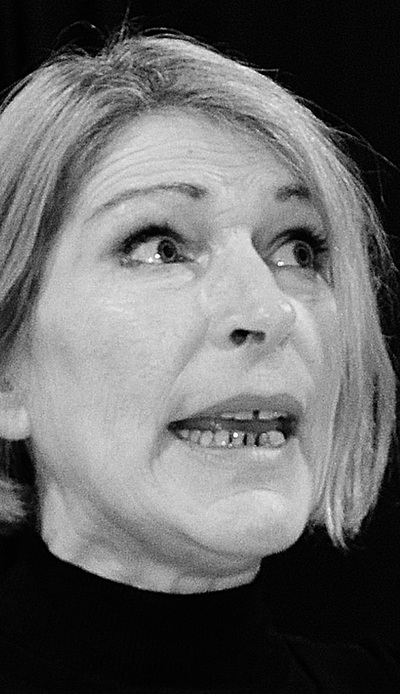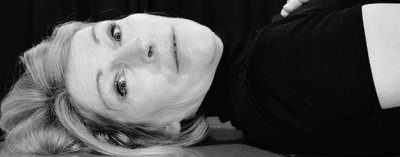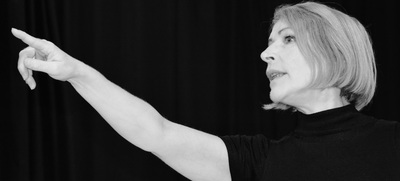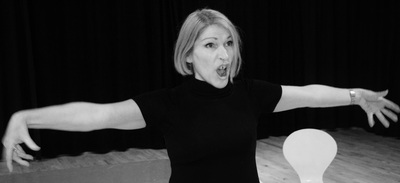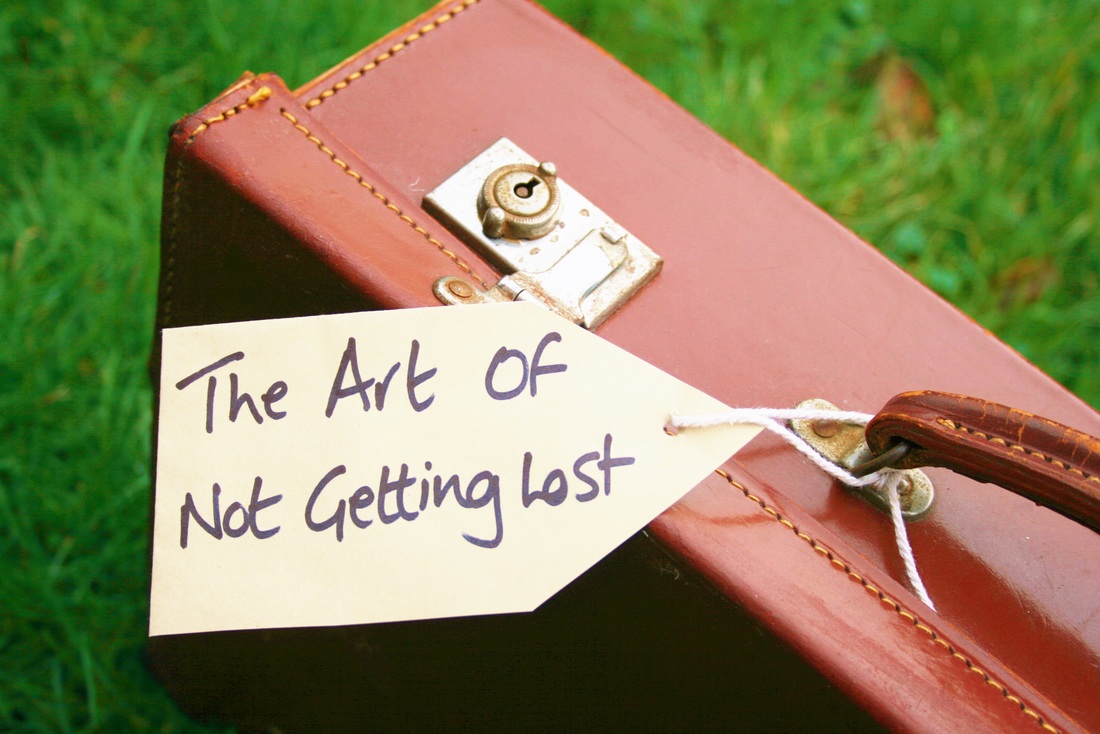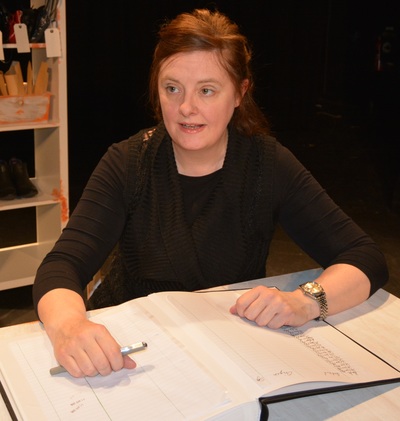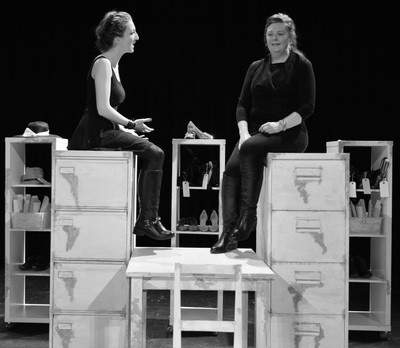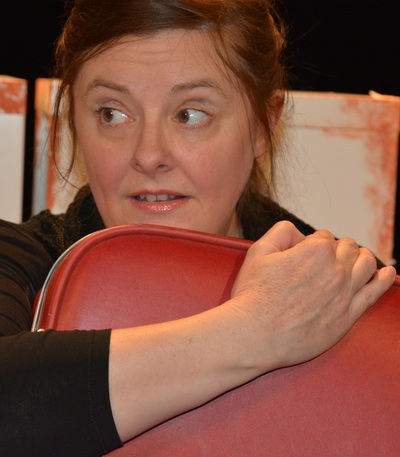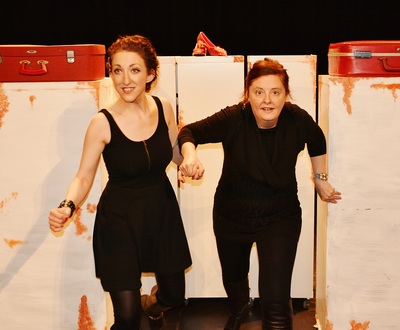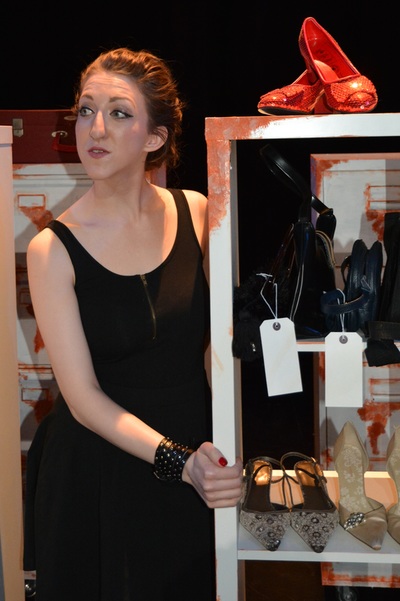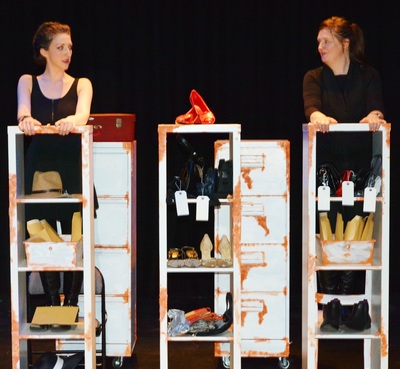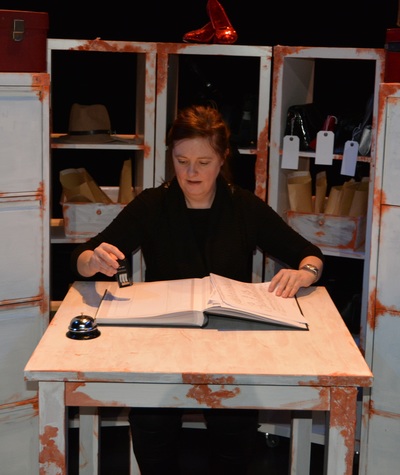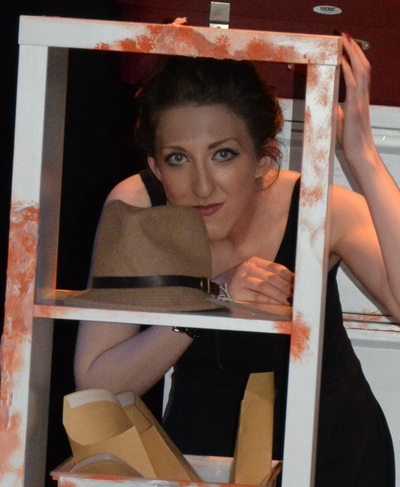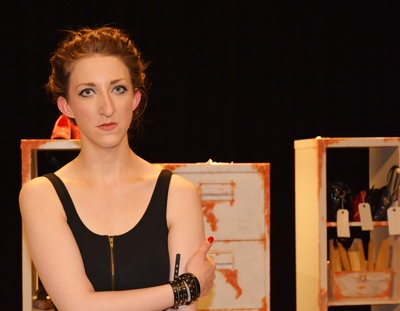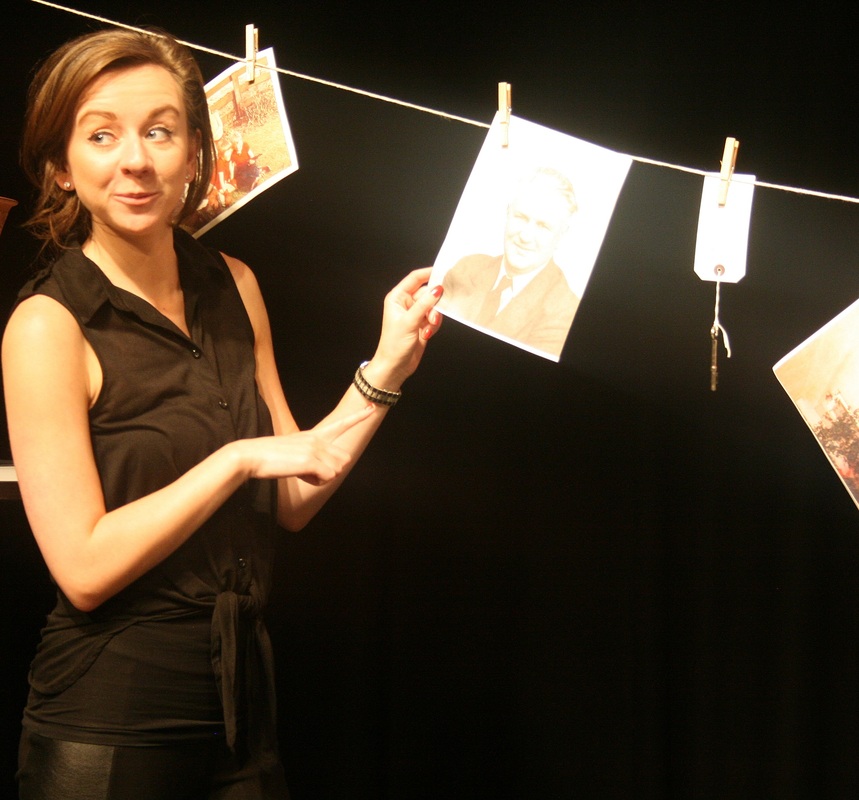An ARC Stockton, Little Cog and Northern Stage Commission
Funny Peculiar
Written and Directed by Vici Wreford-Sinnott
Funny Peculiar
Written and Directed by Vici Wreford-Sinnott
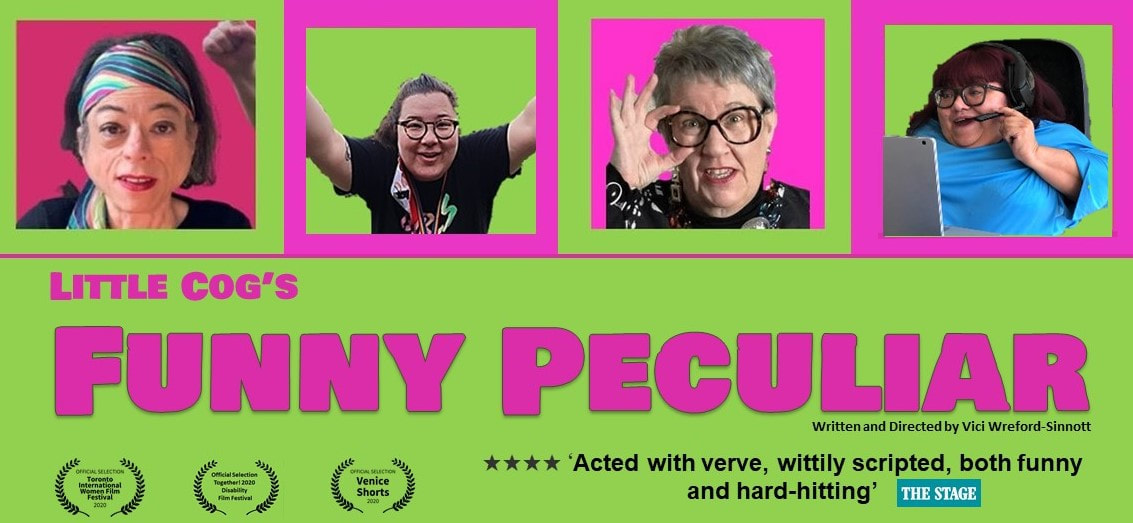
Image description - four portraits of disabled women. Left is Liz Carr plays Zsa Zsa and she is a white woman in her forties, seated in her wheelchair, with a dark brown bob haircut, a stylish long striped scarf in her hair and she is wearing a black top. Next is Bea Webster who is a mixed race woman of dual heritage, Thai and Scottish, with long brown hair and a black top. It says the word girls on it in mixed colurs. She has two arms raised as if she has won a race. To the right of Bea is Vici Wreford-Sinnott who plays Raquelle. She is a white woman in her fifties with spiky silver hair. She is smiling and looking right into the camera as she rearranges her large glasses. Mandy Colleran is at the ed and she plays Blanche. She is a white woman in her fifties wearing a blue top and a headset and mic for her zoom meeting. She is a wheelchair user. The text reads Little Cog's Funny Peculiar written and directed by Vici Wreford-Sinnott. There are film festival laurels for Toronto International Women Festival, Together! 2020 Disability Film Festival and Venice Shorts. There is a quote from a four star review from The Stage newspaper which reads, 'Acted with verve, wittily scripted, both funny and hard-hitting'
Funny Peculiar is the latest lockdown production from Little Cog as part of their Staging Our Futures programme. The piece stars Liz Carr of Silent Witness fame, Mandy Colleran, a comedian and activist, and Bea Webster who is currently an associate of both the Royal Shakespeare Company and The Playwright's Studio of Scotland.
Zsa Zsa, Raquelle, Blanche and Cuba are in quarantine – four disabled women locked down, locked in, shut up and shouted down.
While the rest of the nation is in meltdown, it takes a lot to phase this quartet.
The new terrain is worrying and frustrating but these women are prepared - perhaps they have waited for a moment like this their whole lives.
In a sequence of four original, cross-cutting, witty and wise monologues, broadcasting from their own homes during quarantine, these women are myth-busters giving their all to expose the lie of vulnerability.
Performed by an incredible cast of actors: Liz Carr (from Silent Witness fame), Mandy Colleran (a comedian and activist), Bea Webster (Royal Shakespeare Company and The Playwright’s Studio of Scotland) and Little Cog’s very own Vici Wreford-Sinnott.
Vici has said of the piece, "We are absolutely thrilled to be working with such an amazing cast to tell the stories of disabled women. It feels more important now than ever that we ensure we are visible, given that recent figures have been released showing that disabled women are 11.9 times more likely to die in the current pandemic than other people. Vici continued, "Terms like 'vulnerable' and 'underlying health conditions' have led to thinking that the deaths of certain groups of people are inevitable. Expected and accepted".
An ARC Stockton, Little Cog and HOME Manchester Commission
Siege
Written and Directed by Vici Wreford-Sinnott
Siege
Written and Directed by Vici Wreford-Sinnott
“It is a dynamo solo performance from actor Phillipa Cole and is chock-full of witty and cleverly explored disability politics and feminist issues.”
Disability Arts Online
Vici’s Homemaker commission will present work in two parts – the short film Siege exploring what it means to be disabled and ‘looked at’ and The Wrong Woman Discussions, a series of five themed discussion films between disabled women performance makers. Both can be seen on their own but for the full experience it is recommended to watch the discussions before watching Siege to get the full impact of the work.
Part 1: The Wrong Woman DiscussionsA series of five themed discussion films between disabled women performance makers. Free and available here.
Part 2: Siege – the filmWritten and directed by Vici Wreford-Sinnott
Performed by Philippa Cole
BSL interpretation Sue Lee
The film is available here in captioned, BSL and audio described versions
Siege is a short, filmed character monologue exploring what it means to be disabled and ‘looked at’. It’s from a longer-term piece of work and centres on the character of Mim (rhymes with quim). Mim, performed by the brilliant Philippa Coles, is a funny, edgy radical, trying to live a subversive lifestyle right slap bang in the middle of the radar, with a shame-free approach to the disabled female body, who can’t get a gig. What’s it gonna take to change that?
The monologue is a part of character exploration for a longer piece of work, originally intended to be a national touring production in 2021 – we’ll see what the future now brings but it has been interesting/challenging creating work to share in short film form in the digital realm. It’s neither a beginning nor an ending, it’s just where we are now.
You can find our more about the inspiration behind Siege in this blog post from Vici Wreford-Sinnott.
“As a live performance maker dependent on the electric energy the exchange with a live audience brings, the initial prospect of making work for the internet, which feels bigger than the universe and is currently awash with amazing talent, was quite daunting. But once I’d connected to the themes that interest me most – funny bold women, lesser heard voices and a punk sensibility – I knew it was an opportunity to create a space for something very exciting, possibly explosive.”
Vici Wreford-Sinnott
An ARC Stockton Cultural Shift production in association with Little Cog
Lighthouse
Written and Directed by Vici Wreford-Sinnott
A storm is blowing. Pip is outside on the lighthouse balcony, the freedom of the wind wrapped around her. Mona sits alone by the fire wondering what she has done to deserve this.
Lighthouse tells the story of a d/Deaf mother and daughter, exploring the tensions and comforts within, and is performed by two d/Deaf actors in both BSL and English, with additional interpretation.
Mona’s husband is missing, but their tenancy in the lighthouse and the home she fought for is at risk, so mother and daughter struggle to keep the lighthouse working, trying to cover up that he is gone.
Lighthouse is a poignant piece exploring both the power and limits of love. Against the storm, how will the two d/Deaf women’s relationship survive being thrown between confinement and liberty?
Lighthouse is the third and final professional piece of disabled-led theatre commissioned by Cultural Shift, and written and directed by Vici Wreford-Sinnott. Vici’s pioneering and critically acclaimed work aims to challenge perceptions of disabled people in contemporary British culture, and ask questions about the society we have become. More than holding up a mirror, her productions act as interventions in the cultural landscape.
Lighthouse tells the story of a d/Deaf mother and daughter, exploring the tensions and comforts within, and is performed by two d/Deaf actors in both BSL and English, with additional interpretation.
Mona’s husband is missing, but their tenancy in the lighthouse and the home she fought for is at risk, so mother and daughter struggle to keep the lighthouse working, trying to cover up that he is gone.
Lighthouse is a poignant piece exploring both the power and limits of love. Against the storm, how will the two d/Deaf women’s relationship survive being thrown between confinement and liberty?
Lighthouse is the third and final professional piece of disabled-led theatre commissioned by Cultural Shift, and written and directed by Vici Wreford-Sinnott. Vici’s pioneering and critically acclaimed work aims to challenge perceptions of disabled people in contemporary British culture, and ask questions about the society we have become. More than holding up a mirror, her productions act as interventions in the cultural landscape.
NEWS FLASH - Butterfly named Best One-Person Play 2017 by British Theatre Guide
And it's star Jacqueline Phillips is cast in the new touring season at Shakespeare's Globe in London!
Another England
Written and Directed by Vici Wreford-Sinnott
The piece is set in England 2022, when a national identity crisis is in full swing, exploring what it’s like to fall between the cracks. It’s a dynamic, lively piece with representations of social exclusion and surreal satire, brilliantly performed by Philippa Cole as Rat and Andrew McLay as Murphy.
The subject matter is dark: Rat and Murphy, our two protagonists, have been stripped of their citizenship on the basis of being disabled people and shipped off to camps, but are currently on the run. However, just as in the disability community, we have explored a fantastically subversive underworld of humour and identity which pervades the piece, bringing a sense of colour and vibrancy.
Murphy is a cantankerous old grouch, a bigot, who Rat would normally go to the ends of the earth to avoid. Rat has a social conscience, based on the experiences of her Mum’s lifetime of mis-diagnosis in mental health services, and challenges Murphy’s thinking. Both have been drawn to a derelict house on the outskirts of town and both feel they have a reason for being there, whilst neither wants the other there.
With both of them in hiding, a story of a painful past emerges which directly connects Murphy to the house, a house he feels is his birth right, whilst Rat demands the house is hers as she was there before Murphy – or so she thinks.
They make a pact to play a series of games and whoever wins gets to stay in the house, whilst the other must return to the camps. Rat ensures that the games reveal a lot about identity, and how both mainstream culture and history have impacted on theirs. As the drama unfolds, an England based on a lie emerges, but who will get to stay.
The subject matter is dark: Rat and Murphy, our two protagonists, have been stripped of their citizenship on the basis of being disabled people and shipped off to camps, but are currently on the run. However, just as in the disability community, we have explored a fantastically subversive underworld of humour and identity which pervades the piece, bringing a sense of colour and vibrancy.
Murphy is a cantankerous old grouch, a bigot, who Rat would normally go to the ends of the earth to avoid. Rat has a social conscience, based on the experiences of her Mum’s lifetime of mis-diagnosis in mental health services, and challenges Murphy’s thinking. Both have been drawn to a derelict house on the outskirts of town and both feel they have a reason for being there, whilst neither wants the other there.
With both of them in hiding, a story of a painful past emerges which directly connects Murphy to the house, a house he feels is his birth right, whilst Rat demands the house is hers as she was there before Murphy – or so she thinks.
They make a pact to play a series of games and whoever wins gets to stay in the house, whilst the other must return to the camps. Rat ensures that the games reveal a lot about identity, and how both mainstream culture and history have impacted on theirs. As the drama unfolds, an England based on a lie emerges, but who will get to stay.
Another England Dress Rehearsal Photographs
Philippa Cole and Andrew McLay, with BSL Interpreter Sue Lee
|
|
Butterfly
|
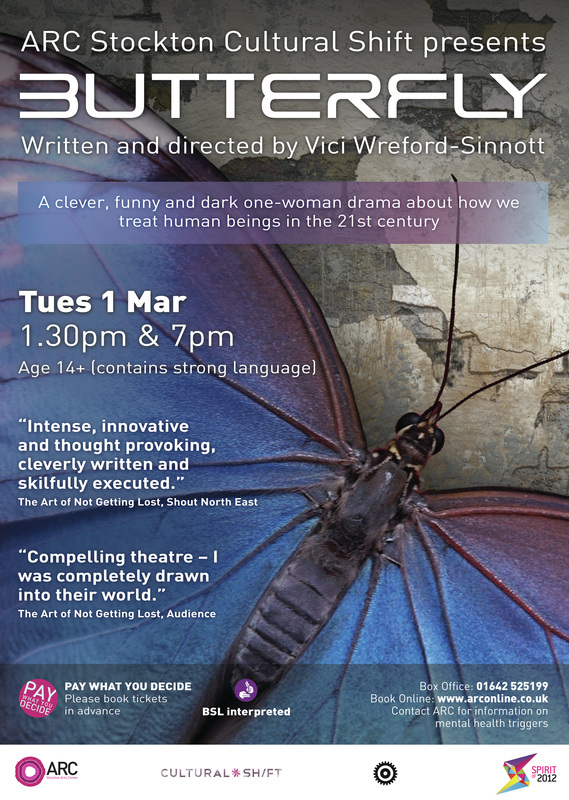
Beatrice, an unlikely heroine, sits in isolation, waiting for the outcome of a forced mental health assessment. She loved Bowie and the Bay City Rollers back then, and now revisits a personal history she only just remembers. But there is an important detail she has forgotten. Boudica and Butterfly guide her through both big historical moments and small personal details to re-imagine the corner she feels she has been painted into. If she could change the past would she?
Beatrice examines whether the chaos theory of stigma has informed the status of people in her present. Whenever that is.
This clever, funny, dark piece allows us to assess how we treat human beings in the 21st century, expertly performed by Jacqueline Phillips.
What this play is not: It is not all in Beatrice’s head – the characters all exist within the world of the piece. It is not an exploration of a mental health condition. It is not about ‘suffering from’ or ‘surviving’ a condition. It is about the history of stigma, and misunderstandings and misrepresentations. It is about setting the record straight.
Oh, and who is Elizabeth?
An ARC Stockton Cultural Shift production developed in association with Little Cog.
Written and Directed by Vici Wreford-Sinnott
Performed by Jaqueline Phillips
Butterfly will be BSL interpreted.
Please contact ARC if you have any queries about mental health triggers in this piece.
Vici is an associate artist of ARC Stockton and is currently working as Disability Agent of Change on their Cultural Shift programme. This creation of this piece has been informed by the experiences of people with mental health problems.
Beatrice examines whether the chaos theory of stigma has informed the status of people in her present. Whenever that is.
This clever, funny, dark piece allows us to assess how we treat human beings in the 21st century, expertly performed by Jacqueline Phillips.
What this play is not: It is not all in Beatrice’s head – the characters all exist within the world of the piece. It is not an exploration of a mental health condition. It is not about ‘suffering from’ or ‘surviving’ a condition. It is about the history of stigma, and misunderstandings and misrepresentations. It is about setting the record straight.
Oh, and who is Elizabeth?
An ARC Stockton Cultural Shift production developed in association with Little Cog.
Written and Directed by Vici Wreford-Sinnott
Performed by Jaqueline Phillips
Butterfly will be BSL interpreted.
Please contact ARC if you have any queries about mental health triggers in this piece.
Vici is an associate artist of ARC Stockton and is currently working as Disability Agent of Change on their Cultural Shift programme. This creation of this piece has been informed by the experiences of people with mental health problems.
Butterfly Development Residency Photos September 2015
Jacqueline Phillips
The Art of Not Getting Lost
at Art Stockton and Northern Stage May/June 2015
Vici Wreford-Sinnott is a professional disabled playwright and theatre director based in the North East of England. Having trained in Theatre Direction at the University of Kent she has worked in theatre and Disability Arts for 23 years. The Art of Not Getting Lost signifies a return to theatre-making after ten years in strategic roles in Disability Arts. The piece tackles mental health stigma using visual, digital, physical, political theatre.
Most of us get lost at some point in our lives, in train stations, car parks, in a maze, the wilderness, the desert, or the forest. We get distracted or have a trauma, and we get bored or ignored. With whatever survival kit we can grab, we try to leave our mark.
Two characters, Everyone and No-One, have made their home in the hidden underground tunnels of Bakerloo Station, creating their own fictional Lost Property centre. The station clock is against them as their presence has been detected, and the heavy boot mob is closing in. The piece is an exploration of friendship, truth and lies, and what happens to people when they are under pressure of stigma. Do they hide, do they look the other way or, do they stand up and be counted. It’s an exploration of the stigma surrounding mental health problems and Everyone and No-one tell the stories of mental health past and present, stolen lives and well kept secrets, and look at how we arrive at our ideas of what is and isn’t ‘normal’.
One in four people will experience mental health distress at some point in our lives. It does not define who we are but there remain many negative and stereotypical perceptions. It affects all of us in some way and if we do not talk about it, it will remain hidden, shameful and stigmatised.
The Art of Not Getting Lost is performed by Ree Collins and Eleanor Crawford.
The performance is BSL Interpreted
“intense, innovative and thought provoking, cleverly written and skilfully executed”
Shout North East
“Compelling theatre. I was completely drawn into the world the characters had created.”
Audience Member Rehearsed Reading at ARC
Most of us get lost at some point in our lives, in train stations, car parks, in a maze, the wilderness, the desert, or the forest. We get distracted or have a trauma, and we get bored or ignored. With whatever survival kit we can grab, we try to leave our mark.
Two characters, Everyone and No-One, have made their home in the hidden underground tunnels of Bakerloo Station, creating their own fictional Lost Property centre. The station clock is against them as their presence has been detected, and the heavy boot mob is closing in. The piece is an exploration of friendship, truth and lies, and what happens to people when they are under pressure of stigma. Do they hide, do they look the other way or, do they stand up and be counted. It’s an exploration of the stigma surrounding mental health problems and Everyone and No-one tell the stories of mental health past and present, stolen lives and well kept secrets, and look at how we arrive at our ideas of what is and isn’t ‘normal’.
One in four people will experience mental health distress at some point in our lives. It does not define who we are but there remain many negative and stereotypical perceptions. It affects all of us in some way and if we do not talk about it, it will remain hidden, shameful and stigmatised.
The Art of Not Getting Lost is performed by Ree Collins and Eleanor Crawford.
The performance is BSL Interpreted
“intense, innovative and thought provoking, cleverly written and skilfully executed”
Shout North East
“Compelling theatre. I was completely drawn into the world the characters had created.”
Audience Member Rehearsed Reading at ARC
The Art of Not Getting Lost Residency Zinc Arts 2014
